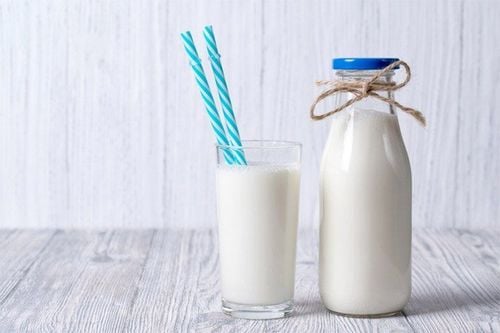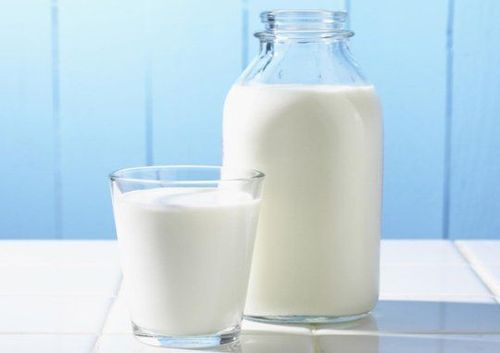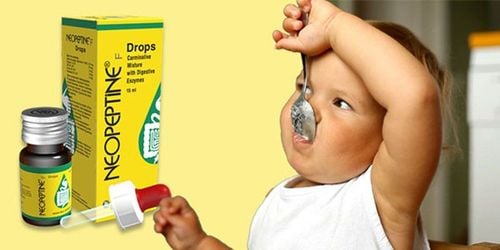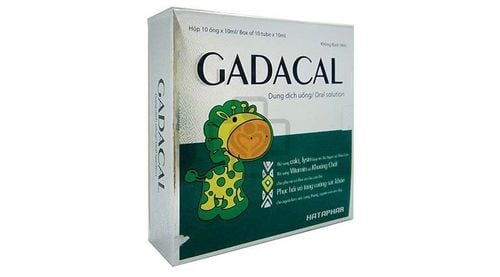This is an automatically translated article.
The article is expertly consulted by Master, Doctor Huynh Bao Toan - Department of Pediatrics - Neonatology - Vinmec Nha Trang International General Hospital.Fresh milk is always used by parents for children to use every day because of its attractive taste, convenience, and especially contains many nutrients to help children grow taller, help strengthen the immune system. However, if not drinking properly, at the right time, fresh milk will adversely affect the health of children.
1. Effects of fresh milk on children
Fresh milk is milk derived from animals such as dairy cows, sheep and goats in the form of unprocessed liquid or freshly processed, unpasteurized or sterilized. In simpler terms, fresh milk is liquid milk that, after being squeezed, is pre-sterilized and then refrigerated before use.Whole milk is milk that is disinfected (pasteurized) without the participation of any other additives or preservatives, then packaged and sold on the market.
Fresh milk and whole milk are both types of milk that have been pasteurized, pasteurized at high temperature in a short time, ensuring the eradication of bacteria while ensuring nutritional content, helping children grow, especially children. in terms of height and weight. Whole milk, because it is pasteurized at a lower temperature, usually has a slightly higher nutritional content than fresh milk. Both types of milk do not contain additives, so it is safe for the digestive system of children, bringing certain benefits when used:
Growth: Milk and dairy products have natural calcium levels. Essential for the growth and development of healthy bones in children. Consuming adequate amounts of milk from childhood and throughout life can help keep children's bones strong and prevent osteoporosis. Enhance physical strength: Protein in milk has high biological quality, helps children develop motor skills and strengthen muscles, helps metabolize nutrients in the body. Boost immunity: Fresh milk, whole milk, and skim milk all help provide a full range of nutrients, vitamins, and minerals for the body. Drinking fresh milk regularly helps children maintain good health, strengthens the immune system, and also has higher blood levels of vitamin D.
Trắc nghiệm: các chỉ số cần chú ý về sự phát triển thể chất của trẻ
Chiều cao, cân nặng của bé ở từng giai đoạn nên là bao nhiêu là bình thường, bao nhiêu là bất thường? Cùng ThS.BS Ma Văn Thấm điểm lại xem bạn đã nắm được các chỉ số phát triển thể chất của bé chưa nhé!The following content is prepared under supervision of Thạc sĩ, Bác sĩ y khoa, Ma Văn Thấm , Nhi , Phòng khám Đa khoa Quốc tế Vinmec Dương Đông(Phú Quốc)
2. Principles for children to drink fresh milk
2.1. Choosing the right type of milk for children The most basic principle when choosing is that the quality of milk must match the needs of the child's development.For children under 2 years old, if you drink fresh milk, you should choose whole milk, not skim milk (unless directed by a doctor) because at this time, the child's brain needs fat to develop. For children over 2 years old, if they are overweight, they should use partially skimmed milk or full skim milk. If the child is of sufficient weight, choose unsweetened milk to reduce the amount of sugar absorbed in the diet. If you drink milk with sugar, you should rinse your mouth after drinking to avoid tooth decay (due to sugar sticking to tooth enamel and being used by bacteria, producing acids that damage tooth enamel), and at the same time reducing the amount of sugar put into the body. from other foods so that the total amount of sugar consumed during the day is less than 20g.
Fresh milk includes 3 types: direct milk, pasteurized and pasteurized milk. In which, children should only drink pasteurized (sterilized) milk to ensure food hygiene and safety. Do not drink cow's milk directly because it is not guaranteed to be clean of bacteria, there is a high risk of gastrointestinal infection.
Products made from fresh milk such as yogurt, cheese, and whey are often used by many parents for children from 6 months old. However, it should only be used in moderation to help children get used to many flavors and diversify foods. If the child eats a lot, the consequences are the same as for the child to drink a lot of fresh milk mentioned above.
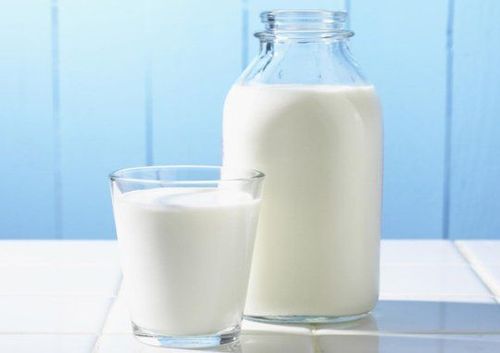
Every day, it is also very important for parents to choose the time to give milk to their children. 2 hours before main meals, children should not drink milk or eat other snacks because it can make children full and lazy to eat at the main meal. The best way is for children to drink fresh milk 1-2 hours after the main meal.
2.3. How much milk a day is appropriate for children? Parents should note that children under 1 year old should not drink fresh milk, only fresh milk should be added to the daily diet of children over 1 year old according to the following specific dosages:
For children over 1 year old: Drink a little fresh milk, about 100ml- 150ml/day. For children over 2 years old, the dose is about 200-300ml/day. Children should be alternated with formula milk (in powder form or ready-made form) because it has been supplemented with iron, zinc, and micronutrients... necessary for children's development needs according to age. For children 2-3 years old and older, it is possible to give them more fresh milk, about 300ml-500ml/day, because at this time, a varied diet will help children receive enough nutrients and have the ability to digest. better absorption of food. For teenagers, fresh milk can be used instead of powdered milk and the total amount of milk is 500-700ml/day. In addition, it is necessary to flexibly combine a nutritious diet. It is very important to note the dosage because there are still many parents who think milk is good for health, especially their children's height, so they try to "force" their children to drink as much as possible. However, if you drink too much milk, your baby will easily become obese, or if your child is not trained in chewing habits, is picky for a long time or has difficulty eating solid foods, leading to malnutrition, lack of fiber causing constipation, and growing body. not comprehensive.
In addition to the addition of fresh milk, parents should pay attention to the nutrition that improves the child's resistance. At the same time, add supporting foods containing lysine, essential micro-minerals and vitamins such as zinc, chromium, selenium, B vitamins,... snacks and less digestive problems.
Parents can learn more:
Why do you need to supplement Lysine for your baby?
The role of zinc - Guidelines for reasonable zinc supplementation
Please visit the website Vinmec.com regularly and update useful information to take care of your baby and family.






